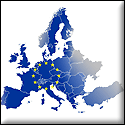

Contact
Center for European Studies
3324 Turlington Hall
PO Box 117342
University of Florida
Gainesville, FL 32611
(352) 294-7142
(352) 392-8966 (fax)
Email
Turkey’s membership application to the EU has been a long and drawn out affair, beginning in the 1960s. Throughout the Cold War, Turkey was felt to be a “tangible” asset within the western alliance to help combat the spread of Communism. Following the collapse of the Soviet Union however, Turkey’s membership within the emerging European Union was questioned and initially rejected. Put simply, several member states and a sizeable portion of public opinion in the West did not feel that Turkey belonged in the “new Europe” for a variety of reasons. Despite this initial setback, Turkey continued to press for membership and began full accession negotiations with the union in 2005, which has helped to spark a larger debate in Europe over what constitutes European or “European-ness”. In concise terms, Turkey has been seen by many as Europe’s “other.” It is often cited as an example of the opposite of what the “West” stands for. It is a country with a 99.6 percent Muslim population, constructed from the remnants of the Ottoman Empire, largely perceived as the eastern threat to western Christendom. In the present climate however, the debate over Turkey’s candidacy to formally join the “West” represents in many ways the types of conceptual problems that the EU is grappling with more generally. Primary among these are:
- What does it mean to be European and can non-Christians be a part of it?
- Where do borders of Europe lie and how far can (should) the EU enlarge?
- How can the EU stem the tide of ultra-nationalist sentiment rising in individual member states?
- Can the EU help promote liberal democratic norms outside its own borders?
- What is the EU’s impact as a regional and/or global actor, and what the EU has to bear in mind when considering a common foreign and security policy?
Aspiring to join the EU also presents serious challenges for Turkey, from both institutional and cultural standpoints. Although the country went through a rapid process of political and economic modernization under Mustafa Kemal Ataturk during the 1920s and 1930s, this is by no means a consolidated journey. The requirement to “conform” to EU standards has, and continues to have, a profound impact on Turkish political culture. The extension of individual and associational rights in the widest sense; developing the rule of law; institutional (and sometimes popular) resistance to conform to EU standards; rising trends in nationalism and, an as of yet limited ability to prove that a Muslim society can espouse liberal democratic ideals all pose potential problems to the future of Turkey within the European Union.